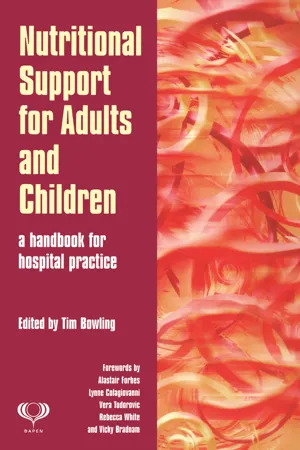Malnutrition is a problem endemic in all countries, and encompasses both under-and overnutrition. This book concerns itself exclusively with undernutrition.
At least 20–30% of patients in European hospitals are undernourished, or at risk of becoming so as a result of their illness. Undernutrition increases complications and costs of care, and is therefore a very significant pressure on healthcare delivery.
To minimise the impact of undernutrition in hospitalised patients, effective and appropriate management must be achieved. Traditionally, certainly in the UK, nutrition has been poorly taught to nurses and at both undergraduate and post-graduate levels to doctors. As a result there is a great deal of ignorance and poor practice at all levels of seniority. Better education in this field is beginning to bear fruit, but there is still a long way to go.
With regards to the practice of nutritional support, multidisciplinary nutrition teams are an ideal means of delivering and leading best practice. However, despite a growing recognition of their benefits to patient care, both in the literature and also by national organisations, less than 50% of UK hospitals and even fewer in many European countries have them. Even where they do exist they are often poorly resourced and can usually only help with a relatively small proportion of patients, who will invariably be at the ‘high tech’ end of the spectrum, e.g. those on intravenous (IV) feeding. Dietitians are another key group, but their numbers are also limited and they cannot see everyone who needs nutritional input. Therefore, the majority of patients rely on ward-based doctors and nurses in all disciplines to look out for, identify and manage undernutrition, and to refer on to more experienced professionals, i.e. dietitians and nutrition teams, those that require particular help.
The abilities and experience of ward-based staff in recognising and managing nutrition-related illness are very poor. This book is therefore aimed specifically at clinicians (from medical student to consultant) and ward nurses (from student to ward sister). We make no apology for pitching it at a very basic level, because it is core knowledge that is lacking and, without this, best practice is not going to be achievable. For the interested reader, there are specific references in the further reading list at the end of each section, and some more generic nutrition references at the end of this chapter.
The book is broadly split into two parts, one dealing with adult-based practice and the other with paediatrics. The same topics are covered. Overall, the intention is to present a brief and succinct but up-to-date guide which will both inform and enable the target readership to improve and optimise their knowledge and practice of nutritional support in the hospital setting.
We have attempted to base any practice recommendations on the highest level of authority that is available. Sometimes this is consensus within and between national organisations. Often, though, such consensus does not exist, for example with peri-operative nutritional support, and then recommendations can only be on the basis of expert opinion. More explicit details for particular situations can be found in the references at the end of each section.
Throughout the book there are examples of practical management of procedures and various clinical situations. In many hospitals there may be local protocols/guidelines. Where these exist they should be referred to.
